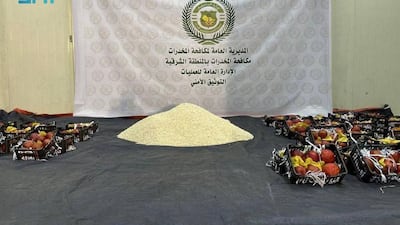Saudi Arabia has banned the import of fruit and vegetables from Lebanon after authorities seized more than 600 million pills and hundreds of kilograms of hashish in the past six years, Riyadh's ambassador to Beirut said on Sunday.
Walid Al Bukhari revealed the full extent of drug seizures days after more than five million captagon pills were found in a shipment of pomegranates that arrived in Jeddah from Lebanon.
“The quantities that were thwarted are enough to drown the entire Arab world, not just Saudi Arabia, in narcotics and psychotropic substances,” Mr Al Bukhari wrote on Twitter.
Last week's discovery, the latest in a long line of drug busts in shipments from Lebanon, prompted Saudi authorities to introduce the ban on produce.
Kuwait, Oman, Bahrain and the UAE have supported the ban, which came into force at 9am on Sunday.
The move has left Lebanese farmers, who rely on exports to the Gulf, reeling and the government in Beirut urgently seeking a response.
Saudi Arabia said fruit and vegetables coming from or transiting through Lebanon are banned until authorities are convinced that Beirut has clamped down on smuggling networks.
The UAE Ministry of Foreign Affairs and International Co-operation said the Emirates supported Saudi measures to protect society from drugs and combat organised crime.
Kuwait's Foreign Ministry said the ban was based on Riyadh’s determination to prevent the smuggling of drugs across its borders.
It also called on Lebanese authorities to ensure exports were free of “prohibited materials”.
Lebanese President Michel Aoun called a meeting of Cabinet and industry leaders for noon on Monday to discuss the ban, which has shaken Lebanon’s agricultural industry and added to fears that the country's economic crisis could worsen.
The Gulf is the most important market for Lebanon’s fruit and vegetable exports – one of the few well-performing sectors in an ailing economy.
Antoine Howayek, who leads the Lebanese Farmers Association, told The National he feared that if other Gulf states follow suit it would cripple the sector's exports.
“All the Gulf countries will go with the same decision – Saudi, Kuwait the UAE, Oman, Bahrain, Qatar,” he said.
“They are 55 per cent of the fruit and vegetable export market for Lebanon.”
He said that while it would take time to see the full impact of the ban, the move would have long-lasting consequences for the country's agricultural sector.
“We need some days to see the results of this but it will be a disaster," Mr Howayek said. “If this product is not exported, all the prices will go down.
"Several sectors will not be able to plant again. We will feel the effects of this for a long time."
He was sceptical of the government’s ability to respond to the crisis.
“I don’t think they will be able to control the drug trade," Mr Howayek said. "They will make statements but effectively the government can’t do much.”
Caretaker Agriculture Minister Abbas Mortada said fruit and vegetable exports to Saudi Arabia were worth up to $24 million a year.
Captagon is an amphetamine commonly used by warring Syrian factions and revellers at parties across the region.
Lebanese authorities claimed the shipment merely transited through the country and had originated in Syria.
It was the latest drugs bust originating from Lebanon in recent months.
On Friday, four tonnes of cannabis bound for Slovakia from Lebanon were seized by Greek authorities at the port of Piraeus.
The production of captagon and other amphetamines has boomed in neighbouring Syria since its civil war erupted 10 years ago.
Its production is widely associated with the Syrian regime and its Lebanese ally, the militant group Hezbollah.
Lebanon’s ports are a major thoroughfare for the banned substances.






